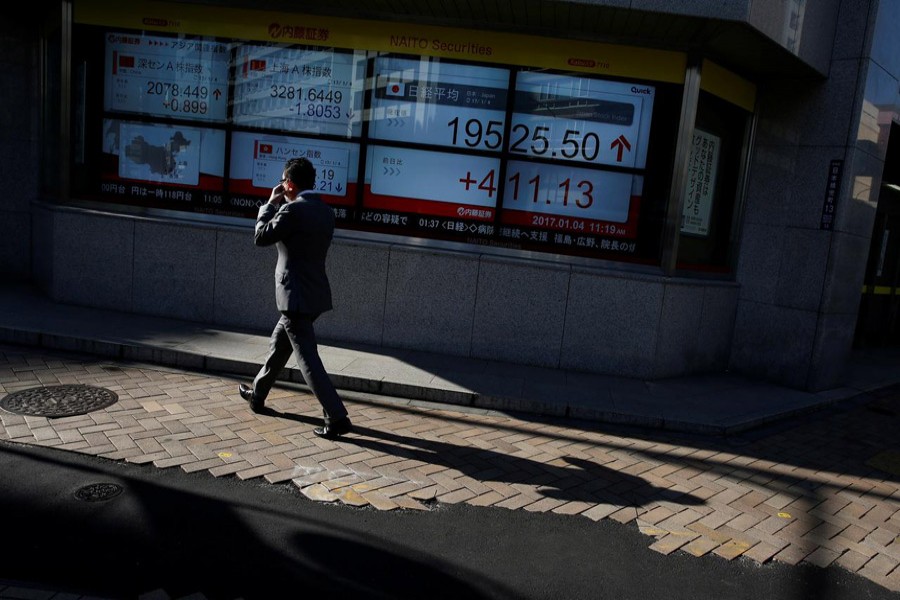Global shares and oil prices extended their rebound on Tuesday on mounting speculation policymakers around the world would move to ease the economic fallout from the spreading coronavirus, ahead of a conference call by Group of Seven heads.
Finance ministers from the group are expected to hold a conference call on Tuesday (1200 GMT), sources said, to discuss measures to deal with the economic impact of the coronavirus outbreak.
“There are hopes that G7 countries will take some sort of coordinated actions to fight the virus, possibly including fiscal spending,” said Masahiro Ichikawa, senior strategist at Sumitomo Mitsui DS Asset Management.
The European Central Bank on Monday joined the chorus of central banks signalling a readiness to deal with the growing threats from the outbreak.
Earlier messages from the US Federal Reserve that it was prepared to act weighed on the greenback against many other major currencies.
The improved mood supported US S&P 500 futures, which rose 0.3 per cent in early Asian trade on Tuesday, a day after the S&P 500 gained 4.60 per cent, the biggest gain since December 2018.
MSCI’s broadest index of Asia-Pacific shares outside Japan gained 1.0 per cent.
South Korea’s Kospi added 1.3 per cent and Australian shares advanced 1.6 per cent ahead of an expected rate cut by the Reserve Bank of Australia.
Japan’s Nikkei lost steam after short-covering ran its course, trading almost flat having given up earlier gains of 1.8 per cent.
The rout in global stocks last week had already prompted Fed Chair Jerome Powell and Bank of Japan Governor Haruhiko Kuroda to flag a readiness to move.
Money markets are fully pricing in an cut of at least 0.25 percentage point to the current 1.50 per cent-1.75 per cent target rate at the Fed’s March 17-18 meeting as well as a 0.10 percentage point cut to the ECB’s key rate at March 12 meeting.
The frantic moves by policymakers reflected growing fears that the disruption to supply chains, factory output and global travel caused by the new epidemic could deal a serious blow to a world economy trying to recover from the US-China trade war.
The Organisation for Economic Cooperation and Development on Monday cut its forecast of global economic growth this year to 2.4 per cent, the lowest since 2009 and down from a forecast of 2.9 per cent in November.
Coronavirus is now spreading much more rapidly outside China than within the country, leading the world into uncharted territory, although the World Health Organization (WHO) has so far stopped short of calling it a pandemic.
In the United States, six people in the Seattle area have died of the illness caused by the new coronavirus, as authorities across the country scrambled to prepare for more infections.
“It would be myopic to think that (economic) policy actions alone will bring back calmness to markets. The reality is, the coronavirus is still spreading,” said Takehiko Masuzawa, head of sales trading for Japanese clients at Macquarie in Tokyo.
Fed rate cuts
The rebound in global stock prices saw US bond yields roll back some of their sharp falls.
The 10-year US Treasuries yield retreated to 1.135 per cent from a record low of 1.030 per cent marked on Monday. The rate-sensitive two-year notes yield jumped back to 0.859 per cent from Monday’s 3 1/2-year low of 0.710 per cent.
Still, the 10-year and two-year yields are down more than 40 and 50 basis points, respectively, from about two weeks ago.
April Fed funds rate futures still price in about 80 per cent chance of a 0.50 percentage point cut this month and a total of almost 1.0 percentage point cuts by the end of year.
Expectations of Fed rate cuts prompted investors to cut their exposure to the dollar.
Against the yen, the dollar lost 0.3 per cent to 107.97 yen, slipping towards a five-month low of 107 set on Monday.
The euro stood at $1.1139, having hit an eight-week peak of $1.1185.
The Australian dollar dropped 0.3 per cent to $0.6517, less than a cent above an 11-year low of $0.64345 set on Friday.
Australia’s central bank is widely expected to cut the policy interest rate to 0.5 per cent from 0.75 per cent, already at a record low.
Oil prices bounced back further after a jump of more than 4.0 per cent on Monday, reversing an early decline to multi-year lows.
Hopes of a deeper output cut by the Organization of the Petroleum Exporting Countries and central banks’ policy measures countered fears of slower growth.
US West Texas Intermediate (WTI) crude futures rose 2.6 per cent to $47.96 a barrel, up sharply from Monday’s low of $43.32 a barrel, which was the lowest since December 2018.
While the coronavirus continues to dominate investor attention, focus has also swung to Super Tuesday in the United States, the biggest day in the Democratic primary elections to choose a challenger to president Donald Trump.


